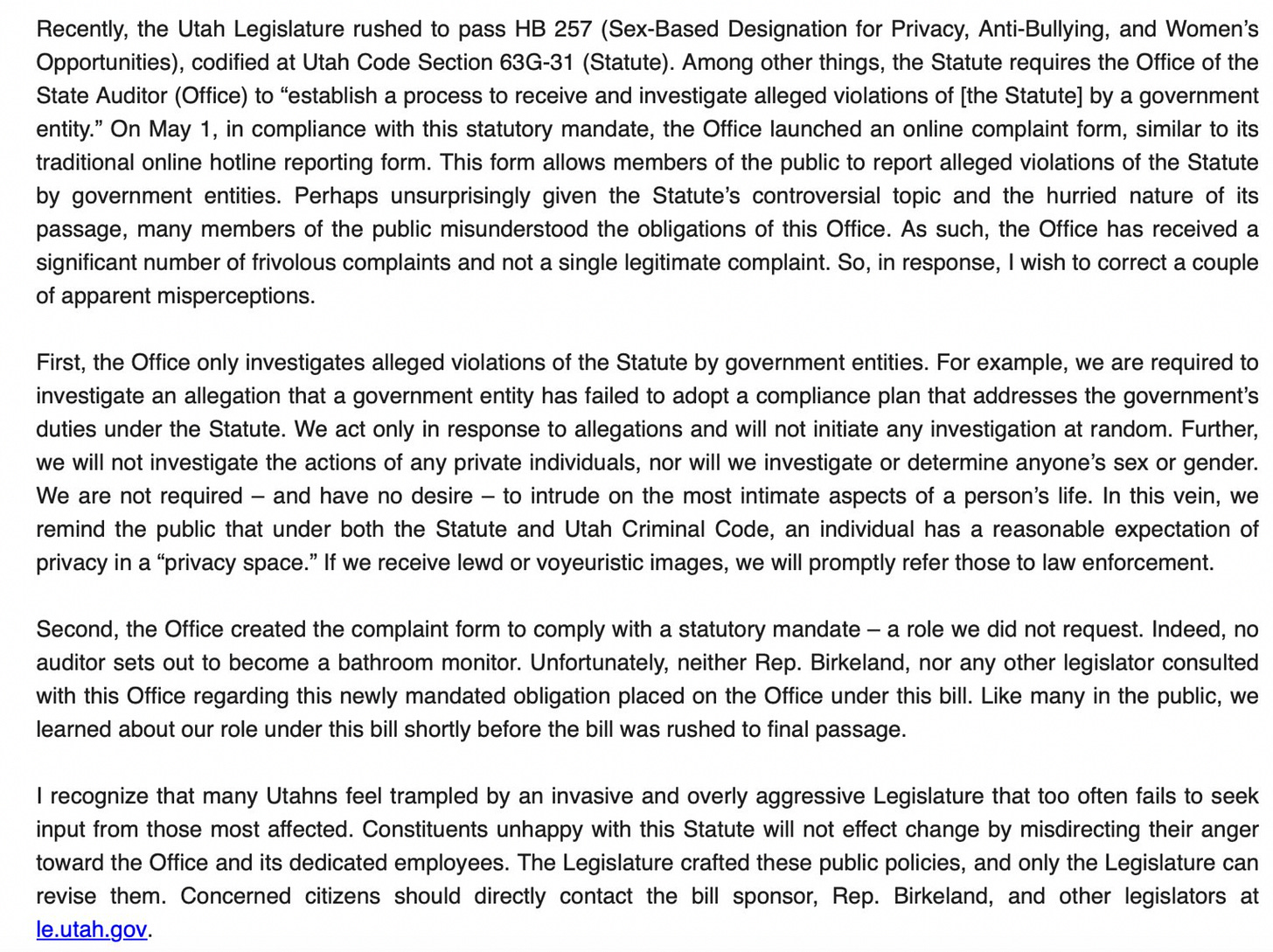Utah Auditor Slams Legislature For Making Him "Bathroom Monitor" After "Snitch Form" Flooded With Meme Complaints
After receiving thousands of meme submissions to a form used to report transgender people in bathrooms, Utah's auditor shared scathing words for the legislature tasking him with the role.

On Wednesday evening last week, the Utah Public Auditor released a form allowing cisgender people to report transgender people in bathrooms. This was done in response to a law passed earlier this year banning transgender people from bathrooms and changing rooms in various circumstances. Within a couple of days, the form was flooded with over 4,000 meme submissions, leading to a flurry of news articles critical of the approach to enforcing anti-transgender bathroom legislation. Now, the Utah Public Auditor is responding to the critiques by deferring blame onto the state legislature for making his office the "bathroom monitor," a role he says he never asked for.
In a statement released today, Utah State Auditor John Dougall called the passage of the bill rushed and stated his office was never consulted during the process of passing the law: "The Office created the complaint form to comply with a statutory mandate – a role we did not request. Indeed, no auditor sets out to become a bathroom monitor. Unfortunately, neither Rep. Birkeland, nor any other legislator consulted with this Office regarding this newly mandated obligation placed on the Office under this bill. Like many in the public, we learned about our role under this bill shortly before the bill was rushed to final passage."
You can view the full statement here:
The statement is in response to widespread criticism and outcry over the use of the form to target transgender people. The form included a section where people could upload images, among other things, to support their allegations. This led to fears that the form would encourage members of the public to act as vigilante bathroom police, taking pictures of people they thought were transgender in private bathroom spaces. This was a criticism shared by Senator Jennifer Plumb, a vocal critic of the legislation, who posted shortly after its release, stating, "Apparently Utah's solution to people feeling unsafe in restrooms is to encourage folks to take photos of & focus extreme attention on the private parts of others who are taking care of a biological need to eliminate waste?"
The form was quickly recognized as a threat to transgender people, and in response, thousands of people flooded the tip line with frivolous complaints and memes, over 4,000 in all. Memes sent to the form included the yelling cat meme, Godzilla with trans pride flags, the entire script to the Bee Movie, and more. In a separate twist, private data such as images from those who submitted forms was leaked through an open database, which allowed some of these meme submissions to be publicly viewable for a short time.
The ordeal over the bathroom reporting tool in Utah mirrors problems seen in many other anti-trans bathroom laws targeting transgender adults. These laws are extremely difficult to enforce. Questions of enforcement were brought up often in the debate, with many pointing out that you can't always tell who is transgender. This sentiment was shared in the Senate Business and Labor Committee by Dustin Parmley, a public defender, who stated, "This bill is impossible to enforce. It relies on citizens to determine if someone is feminine or masculine enough to use it. The exceptions are for hidden conditions, such as someone's surgery or birth certificate. It will lead to unnecessary police investigations."
It remains to be seen what the future of the form looks like. Already, the option to submit a picture has been removed. There is no indication that any actionable complaints have been submitted. Other attempts to create such forms have similarly failed, such as in Virginia, where Governor Glenn Youngkin's tip line was flooded with complaints about Beowulf, or in Missouri, where scripts for the Bee Movie were sent in. In this case, it appears that when faced with problems enforcing anti-trans laws, the state of Utah attempted to sidestep the issue by abdicating the responsibility of enforcement to its citizens. In its “rush” to pass the legislation, those who pointed out that such a bill would create “bathroom police” appear to have been proven correct.



The predictable result is a thing of beauty!
4,000 thank yous to the good folks who told Utah GFY.